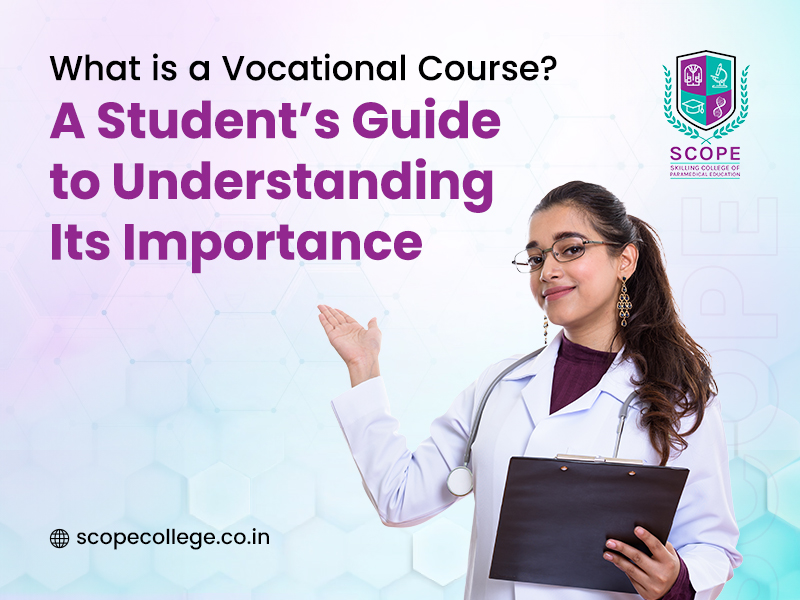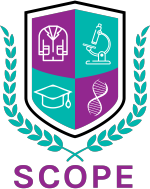
In an increasingly competitive world, traditional education often leaves students searching for practical ways to bridge the gap between their academic knowledge and career aspirations. This is where vocational courses step in. Designed to offer career-specific education, vocational programs empower students with the skills and expertise needed to excel in their chosen fields.
If you’ve ever wondered what is a vocational course, this comprehensive guide explains everything—from their significance to how they can align with your career goals. We’ll also introduce you to the specialized vocational courses offered by SCOPE College, a leader in paramedical education.
Understanding Vocational Courses: The Basics

A vocational course is a specialized educational program designed to equip students with practical skills and industry-specific knowledge. Unlike traditional academic programs, which focus on theoretical concepts, vocational courses emphasize hands-on training and job readiness. These courses are tailored to meet the demands of specific industries, making them ideal for students who wish to start their careers immediately after graduation.
Key Features of Vocational Courses:
- Hands-On Training: Focus on real-world applications and problem-solving.
- Job Readiness: Students are prepared to enter the workforce with practical skills.
- Shorter Duration: Typically shorter than traditional degree programs.
- Flexibility: Open to students from all educational backgrounds, including science, commerce, and arts.
Vocational courses are crucial in industries like healthcare, technology, and trade, where specialized skills are in high demand.
The Importance of Vocational Education in Today’s World
The global job market is evolving rapidly, and employers are increasingly seeking candidates with industry-specific expertise. Vocational courses provide students with this edge by focusing on practical knowledge and real-world applications.
Why Vocational Education Matters:
- Bridges the Skills Gap: Vocational training ensures students are industry-ready from day one.
- Enhances Employability: Programs often include internships or on-the-job training, making graduates more attractive to employers.
- Career Versatility: Offers multiple career paths within a chosen field.
- Financial Independence: Vocational courses enable students to start earning earlier than traditional degrees.
With vocational training, students are not only prepared for jobs but also empowered to excel in their careers.
Scope College : Redefining Vocational Education
We have emerged as a pioneer in vocational education, particularly in paramedical sciences. With a focus on hands-on training and industry alignment, We offers students the opportunity to gain practical expertise in state-of-the-art facilities.
Why Choose SCOPE College?
Here are the key reasons why we stands out:
- Advanced Lab Facilities: Equipped with cutting-edge technology for practical training.
- Global and Local Placement Support: Strong partnerships with leading healthcare institutions.
- Government Hospital Internships: Exposure to real-world medical scenarios.
- 100% Job Placement Guarantee: A commitment to students’ career success.
- Government Recognition: Accredited programs with industry validation.
- Flexible Learning: Weekend batches and blended online-offline learning options.
- Financial Aid Options: Making education accessible to all.
- Experienced Faculty: Learn from industry experts with years of practical experience.
- Alumni Network: Continued support even after course completion.
These USPs ensure students receive an education that goes beyond the classroom, preparing them for rewarding careers.
Specialized Vocational Courses at SCOPE College
We offers two specialized Bachelor of Vocation (B.Voc) programs that cater to the booming healthcare sector. These courses combine theoretical knowledge with practical training, making graduates job-ready.
Bachelor of Vocation in Radiology and Medical Imaging Technology

The Bachelor of Vocational in Radiology and Medical Imaging Technology is a specialized program designed to train students in diagnostic imaging, including X-rays, CT scans, and MRIs. This 2 or 3-year bachelor’s program, affiliated with the government, focuses on building technical and professional skills through practical training in state-of-the-art labs and internships in government hospitals.
Key Details
- Eligibility: Lateral entry for 10 + 3 (SSC + Diploma) or 12th from any stream
- Salary Range: ₹2,00,000 to ₹5,00,000 per year
- Employment Areas: Government/Private hospitals, Medical imaging labs, Radiography centers, Rehabilitation centers
- Affiliation: Government-recognized
Program Highlights
- Training in advanced radiographic techniques and equipment.
- Practical exposure in modern imaging labs.
- Industry-aligned curriculum to meet healthcare demands.
- Real-world experience through internships in hospitals.
Career Opportunities
Graduates can work as radiology technicians or imaging professionals in hospitals, labs, and diagnostic centers. With increasing reliance on medical imaging, this field offers substantial growth and competitive salaries.
For more insights, explore:
Start your journey today! Enroll Now or Contact Us for more information.
Bachelor of Vocation in Medical Lab Technology

The Bachelor of Vocational in Medical Lab Technology is a government-affiliated bachelor’s program designed to train students in advanced diagnostic testing and laboratory procedures. Over a duration of 2 or 3 years, this course prepares students to handle diagnostic tools, conduct critical medical tests, and contribute significantly to patient care.
Key Details
- Eligibility: Lateral entry for 10 + 3 (SSC + Diploma) or 12th from any stream
- Salary Range: ₹3,00,000 to ₹5,00,000 per year
- Employment Areas: Hospitals, Clinics, Medical labs, Nursing homes
Program Highlights
- Training in pathology, microbiology, and biochemistry.
- Hands-on experience with diagnostic tools and techniques.
- Internship opportunities in reputed medical institutions.
This program ensures students are fully equipped to excel as medical lab technicians, a vital role in healthcare. Start your journey today! Enroll Now or Contact Us for more details.
Who Can Enroll in Vocational Courses?

Vocational courses are suitable for students from all academic streams—science, commerce, or arts—looking for practical training and job-specific skills. Whether you’re a recent high school graduate or a working professional seeking a career switch, vocational programs can be tailored to meet your needs.
Benefits for Diverse Backgrounds:
- Science Students: Ideal for careers in healthcare and technology.
- Commerce Students: Opportunities in technical roles with managerial potential.
- Arts Students: Access to creative and skill-based professions.
Our Commitment to Career Success
We go beyond academic learning by offering students a comprehensive career development framework. From internships to job placements, the college ensures every student is set on a path to success.
Career Support Includes:
- On-the-job training (OJT) in government hospitals.
- 100% placement assistance in reputed organizations.
- Alumni network for continuous career guidance.
A Step Towards a Bright Future
Vocational education is the key to unlocking rewarding career opportunities. By choosing a program that aligns with your goals, you can ensure a fulfilling and financially secure future. We’re committed to helping you achieve this with our specialized vocational Courses.
Ready to Start Your Journey?
- Contact Us for personalized guidance.
- Enroll Now to secure your spot in one of our programs.
Don’t wait—your dream career is just a click away!
Frequently Asked Questions
What is the best course in vocational?
The best vocational course depends on your career goals and interests. Courses in healthcare, technology, and skilled trades are highly regarded due to their industry demand and career potential.
Here are two excellent vocational courses are:
Bachelor of Vocational in Radiology and Medical Imaging Technology: Ideal for students interested in diagnostic imaging and radiology.
Bachelor of Vocation in Medical Lab Technology: Perfect for those aiming for a career in medical diagnostics and lab testing.
Both programs offer practical training, government affiliation, and excellent placement opportunities.
What is the meaning of vocational education?
Vocational education refers to training programs designed to equip students with practical skills and industry-specific knowledge for a particular career. Unlike traditional academic education, vocational courses emphasize hands-on experience, making students job-ready immediately after graduation. For example, our vocational programs focus on practical training in healthcare, providing real-world experience through internships and advanced lab facilities.
Which type of training would be considered vocational?
Vocational training involves practical, career-focused instruction in fields that require specific technical skills. Examples include:
Radiology Training: Learning to operate X-ray, CT, and MRI machines.
Medical Lab Training: Conducting diagnostic tests and handling laboratory equipment.
These programs are typically shorter in duration and directly prepare students for roles in industries such as healthcare, technology, and skilled trades.
What is the difference between vocational school and college?
The primary difference lies in their focus:
Vocational School: Offers short-term, skill-based training programs that prepare students for specific careers. These are often certificate or diploma courses.
College: Provides a broader education, including theoretical and general knowledge, often leading to degree programs.
At SCOPE College, students benefit from vocational programs that combine the practical, job-focused approach of vocational schools with the in-depth education and credentials of a college, ensuring both skill development and career growth.

